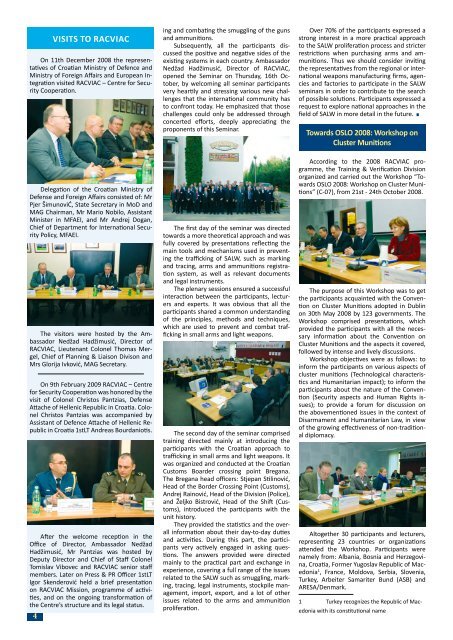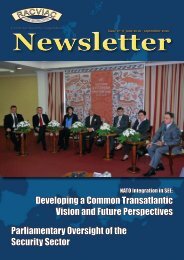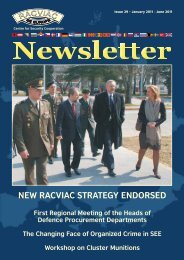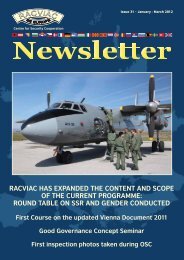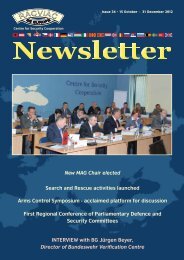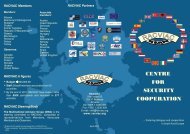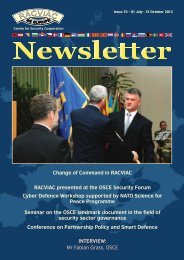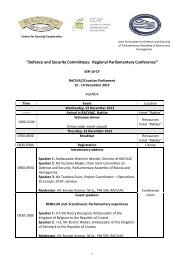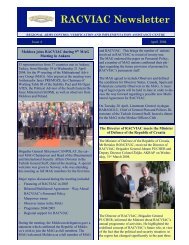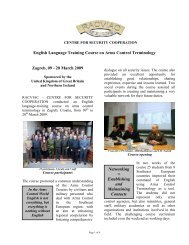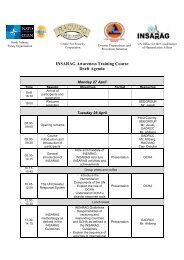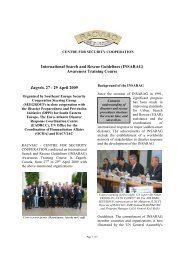20th MULTINATIONAL ADVISORY GROUP MEETING ... - RACVIAC
20th MULTINATIONAL ADVISORY GROUP MEETING ... - RACVIAC
20th MULTINATIONAL ADVISORY GROUP MEETING ... - RACVIAC
You also want an ePaper? Increase the reach of your titles
YUMPU automatically turns print PDFs into web optimized ePapers that Google loves.
Visits to <strong>RACVIAC</strong><br />
On 11th December 2008 the representatives<br />
of Croatian Ministry of Defence and<br />
Ministry of Foreign Affairs and European Integration<br />
visited <strong>RACVIAC</strong> – Centre for Security<br />
Cooperation.<br />
ing and combating the smuggling of the guns<br />
and ammunitions.<br />
Subsequently, all the participants discussed<br />
the positive and negative sides of the<br />
existing systems in each country. Ambassador<br />
Nedžad Hadžimusić, Director of <strong>RACVIAC</strong>,<br />
opened the Seminar on Thursday, 16th October,<br />
by welcoming all seminar participants<br />
very heartily and stressing various new challenges<br />
that the international community has<br />
to confront today. He emphasized that those<br />
challenges could only be addressed through<br />
concerted efforts, deeply appreciating the<br />
proponents of this Seminar.<br />
Over 70% of the participants expressed a<br />
strong interest in a more practical approach<br />
to the SALW proliferation process and stricter<br />
restrictions when purchasing arms and ammunitions.<br />
Thus we should consider inviting<br />
the representatives from the regional or international<br />
weapons manufacturing firms, agencies<br />
and factories to participate in the SALW<br />
seminars in order to contribute to the search<br />
of possible solutions. Participants expressed a<br />
request to explore national approaches in the<br />
field of SALW in more detail in the future.<br />
Towards OSLO 2008: Workshop on<br />
Cluster Munitions<br />
Delegation of the Croatian Ministry of<br />
Defense and Foreign Affairs consisted of: Mr<br />
Pjer ŠimunoviĆ, State Secretary in MoD and<br />
MAG Chairman, Mr Mario Nobilo, Assistant<br />
Minister in MFAEI, and Mr Andrej Dogan,<br />
Chief of Department for International Security<br />
Policy, MFAEI.<br />
The visitors were hosted by the Ambassador<br />
Nedžad Hadžimusić, Director of<br />
<strong>RACVIAC</strong>, Lieutenant Colonel Thomas Mergel,<br />
Chief of Planning & Liaison Divison and<br />
Mrs Glorija Ivković, MAG Secretary.<br />
On 9th February 2009 <strong>RACVIAC</strong> – Centre<br />
for Security Cooperation was honored by the<br />
visit of Colonel Christos Pantzias, Defense<br />
Attache of Hellenic Republic in Croatia. Colonel<br />
Christos Pantzias was accompanied by<br />
Assistant of Defence Attache of Hellenic Republic<br />
in Croatia 1stLT Andreas Bourdaniotis.<br />
After the welcome reception in the<br />
Office of Director, Ambassador Nedžad<br />
Hadžimusić, Mr Pantzias was hosted by<br />
Deputy Director and Chief of Staff Colonel<br />
Tomislav Vibovec and <strong>RACVIAC</strong> senior staff<br />
members. Later on Press & PR Officer 1stLT<br />
Igor Skenderović held a brief presentation<br />
on <strong>RACVIAC</strong> Mission, programme of activities,<br />
and on the ongoing transformation of<br />
the Centre’s structure and its legal status.<br />
4<br />
The first day of the seminar was directed<br />
towards a more theoretical approach and was<br />
fully covered by presentations reflecting the<br />
main tools and mechanisms used in preventing<br />
the trafficking of SALW, such as marking<br />
and tracing, arms and ammunitions registration<br />
system, as well as relevant documents<br />
and legal instruments.<br />
The plenary sessions ensured a successful<br />
interaction between the participants, lecturers<br />
and experts. It was obvious that all the<br />
participants shared a common understanding<br />
of the principles, methods and techniques,<br />
which are used to prevent and combat trafficking<br />
in small arms and light weapons.<br />
The second day of the seminar comprised<br />
training directed mainly at introducing the<br />
participants with the Croatian approach to<br />
trafficking in small arms and light weapons. It<br />
was organized and conducted at the Croatian<br />
Customs Boarder crossing point Bregana.<br />
The Bregana head officers: Stjepan Stilinović,<br />
Head of the Border Crossing Point (Customs),<br />
Andrej Rainović, Head of the Division (Police),<br />
and Željko Bistrović, Head of the Shift (Customs),<br />
introduced the participants with the<br />
unit history.<br />
They provided the statistics and the overall<br />
information about their day-to-day duties<br />
and activities. During this part, the participants<br />
very actively engaged in asking questions.<br />
The answers provided were directed<br />
mainly to the practical part and exchange in<br />
experience, covering a full range of the issues<br />
related to the SALW such as smuggling, marking,<br />
tracing, legal instruments, stockpile management,<br />
import, export, and a lot of other<br />
issues related to the arms and ammunition<br />
proliferation.<br />
According to the 2008 <strong>RACVIAC</strong> programme,<br />
the Training & Verification Division<br />
organized and carried out the Workshop “Towards<br />
OSLO 2008: Workshop on Cluster Munitions”<br />
(C-07), from 21st - 24th October 2008.<br />
The purpose of this Workshop was to get<br />
the participants acquainted with the Convention<br />
on Cluster Munitions adopted in Dublin<br />
on 30th May 2008 by 123 governments. The<br />
Workshop comprised presentations, which<br />
provided the participants with all the necessary<br />
information about the Convention on<br />
Cluster Munitions and the aspects it covered,<br />
followed by intense and lively discussions.<br />
Workshop objectives were as follows: to<br />
inform the participants on various aspects of<br />
cluster munitions (Technological characteristics<br />
and Humanitarian impact); to inform the<br />
participants about the nature of the Convention<br />
(Security aspects and Human Rights issues);<br />
to provide a forum for discussion on<br />
the abovementioned issues in the context of<br />
Disarmament and Humanitarian Law, in view<br />
of the growing effectiveness of non-traditional<br />
diplomacy.<br />
Altogether 30 participants and lecturers,<br />
representing 23 countries or organizations<br />
attended the Workshop. Participants were<br />
namely from: Albania, Bosnia and Herzegovina,<br />
Croatia, Former Yugoslav Republic of Macedonia<br />
1 , France, Moldova, Serbia, Slovenia,<br />
Turkey, Arbeiter Samariter Bund (ASB) and<br />
ARESA/Denmark.<br />
1 Turkey recognizes the Republic of Macedonia<br />
with its constitutional name


